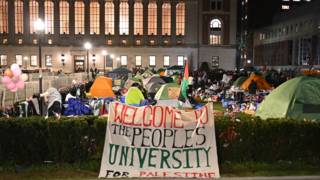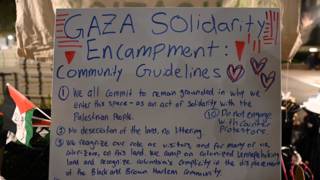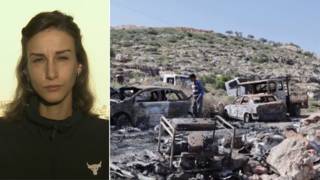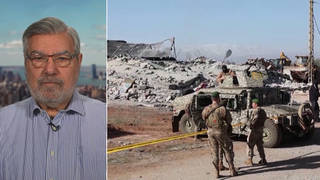
Related
Guests
- Edward Saidprofessor at Columbia University and author of Culture and Imperialism.
Thursday, in the deadliest attack in a week, Israeli airstrikes killed at least 75 Lebanese civilians who were refugees seeking shelter at a base for U.N. peacekeepers. Israel has been pounding what it claims are Hezbollah guerrilla positions for eight days. Secretary of State Warren Christopher has canceled his trip to Moscow and is instead headed to the Middle East to try and negotiate a ceasefire.
Transcript
AMY GOODMAN: After yesterday’s bloodbath in southern Lebanon in which Israel attacked a U.N. base, killing more than 100 Lebanese civilians, President Clinton says he’s somewhat hopeful that the warring sides will agree to international appeals for a ceasefire, as he dispatched Secretary of State Warren Christopher to the Middle East. While Clinton refused to single out Israel for condemnation, in a rare display of unity, Europe recoiled in horror and urged Israel to abandon its Grapes of Wrath blitz on Hezbollah guerrillas. And the Vatican condemned Israel, saying, “There are no political or military reasons which can justify such dramatic consequences.”
We now turn to Dr. Edward Said, author of Culture and Imperialism. Said served on the Palestine National Council for many years, was born in Jerusalem and is a professor of comparative literature at Columbia University.
Professor Said, welcome. What is your reaction to yesterday’s events?
EDWARD SAID: Well, it’s pretty predictable. I mean, they have trumpeted, the Israelis, their surgical strikes and their care about civilians and all the rest of it. Yeah, it’s a sort of massive propaganda effort to paper over what in fact they’re doing. But it’s caught up with them, you know, and I think it’s made it quite clear that their aims in Lebanon are far from Hezbollah. I think they’re trying to destroy the Lebanese economy. I think they’re trying to put pressure on Syria. And I think, obviously, that Peres is trying to win an election. It has very little to do with security or the truth or anything like that. But, unfortunately, the story is not only there, but also the incredible powerlessness of the Arabs, who are divided — in the case of Lebanon, helplessly weak, and in the case of the others, just hanging about, waiting for the Americans to do something.
AMY GOODMAN: What about the American response? Democracy Now! is an election show, and we are looking at foreign policy in terms of presidential politics. In fact, we wanted to play for you President Clinton’s response last night as he arrived in St. Petersburg, came down the steps of the plane and talked to the press about what he had learned on the plane.
PRESIDENT BILL CLINTON: Today’s events make painfully clear the importance of bringing an end to the current violence in Lebanon. To achieve that goal, I call upon all parties to agree to an immediate ceasefire. And the end of the fighting is essential to allow our diplomatic efforts to go forward. Resolving the current situation will not only stop human suffering, it will help us all to make further progress toward our goal of a comprehensive and lasting peace in the Middle East.
AMY GOODMAN: Your response, Professor Said?
EDWARD SAID: Well, it very carefully avoids mentioning Israel or condemning it in any way. About a year ago, an Israeli reporter wrote an article for the Israeli press in which he said that when he called up the State Department, he wasn’t sure whether he was talking to the Israel Foreign Affairs Ministry or the U.S. State Department. I think this, plus the events of the last two, three years, demonstrate that the United States government, with Clinton at its head, are an extension of Israeli foreign policy, not the other way around. The head of the Middle East division of the State Department, the man in charge of policy, Christopher being sort of permanently on vacation — I mean mental vacation — is a man called Dennis Ross, who is a former employee of the Israeli lobby. And he’s surrounded by like-minded people. The United States, and Clinton in particular, feels that it can only move forward in the Middle East with Israel in the front of its sights, and the Israeli agenda has been adopted by the United States in the peace process from the very beginning.
So, see, both as an American and as a Palestinian, as an Arab, you know, I am of course shocked, but it is the continuing extension of, you know, years of U.S. foreign policy in which facts, justice, the possibilities of permanent peace are trampled underfoot as the juggernaut continues, and the Israelis, in what I consider to be an orgy of self-righteous violence, wreak havoc on everything around them. And I think at the core of the whole thing is the Israeli sense that Arabs are contemptible, racially inferior people, and they can be killed with impunity.
AMY GOODMAN: Now, of course, what Peres says and what Israeli supporters say is that Israel was responding to these Katyusha rockets that the Hezbollah was firing into northern Israel, and they had done it right next to the U.N. base in southern Lebanon, and this is why this mistake occurred, that in fact that they were responding, that they were not the aggressor.
EDWARD SAID: Right. Well, that, of course, is a total lie. The fact is that beginning on March the 4th, there have been a series of quite serious Israeli defeats, military defeats, by Hezbollah in southern Lebanon. Your listeners should know that Israel has been a military occupation, illegal military occupation, of a strip of Lebanese territory in the south of Lebanon, on the pretext that Israel was protecting its northern border. In addition, the Israelis have, of course, ravaged the place and have installed a mercenary army called the South Lebanese Army, headed by a cashiered Lebanese officer called Lahad, and have tried to maintain order in the strip.
And, of course, they have succeeded not at all. The Hezbollah have developed [inaudible] capabilities, so that in the last year, for example, no Israeli reporter has been allowed into south Lebanon. The Israeli troops are constantly hunkered down. They can’t move out of their fixed positions, and they are constantly harassed by Hezbollah guerrillas, who are described routinely by The New York Times as terrorists and by much of the Western media in the same way, but are seen by nearly everyone else in the world as, in effect, repulsing a foreign occupation, which in fact it is. Israel has made no secret of it, but the press in this country simply mutes it over.
And so, what really happened was that the Israelis decided that they couldn’t win the way they were proceeding. They lost four soldiers on March the 4th. They lost another on March the 10th, all in the occupied — in occupied Lebanese territory, not in Israel at all. On March the 14th, five more Israeli soldiers were wounded by Hezbollah. And Hezbollah — I was in Jerusalem at the time. On March the 20th, there was a suicide bomber who killed one Israeli soldier, also in south Lebanon. Then, on March the 30th, they came across the border, the Israelis, and decided to uproot Hezbollah, having failed to do so through occupation, through ravagement and so on.
And what they did was a bombing of the south, deliberately to create 400,000 to 500,000 refugees, which are, of course, terror tactics. I mean, in my opinion, Israel has behaved like a gangster and a terrorist state. I mean, if anywhere there is terrorism to be found, it is in Israel’s behavior, which has no regard for human life, especially if it’s Arab life, and has proceeded to destroy the south, attack civilians. They’ve hit ambulances. They’ve hit hospitals. They’ve hit schools. They’ve hit refugee camps. And it all [inaudible] couldn’t be hidden. They couldn’t say that they were trying to kill Hezbollah, so they killed 105 civilians.
You know, Hezbollah is a guerrilla force. It has representatives in the Lebanese Parliament. It is rooted in Lebanese — these are Lebanese people fighting for their own freedom from Israeli military occupation. So, literally everything that Israel has said in the last two weeks is, in fact, a lie, a fiction, invented on grounds, you know, that they are fighting against Islam. And this is legitimized by the Sharm el-Sheikh summit, which was bulldozed into existence by the Americans to give Israel more ammunition to do this. And the ultimate goal, of course, is the election of Peres and the election of Clinton. You know, one could say, cynically, that that’s the way democracies operate.
And, of course, in Israel, there’s a report today in The Christian Science Monitor — and my son is living on the West Bank, was telling us the same thing — that the war has been carried on Israeli television like the Gulf War, so you got the impression of surgical strikes. No civilian casualties have been shown, none of the devastation, none of the refugees, and so on and so forth.
I think the ultimate goal, of course — one of the other goals is to destroy the Lebanese economy, which is beginning to come back after 15 or 17 years of civil war and which poses a threat to Israel’s economic domination of the region, and also, in the process, to stick it to Syria, which has been resisting Israeli terms for a peace settlement, terms which are of course totally unacceptable, with a very slim hope of any withdrawal by the Israelis from the Golan Heights, occupied since 1967. Israel has also demanded from Syria that it dismantle 60% of its Army, withdraw its defenses to the other side of Damascus, withdraw its missiles, etc. And Israel does none of that.
So, these are the tactics of a state that is, in effect, carried now financially and morally and politically by the United States taxpayer. We subsidize Israel in its, in my opinion, gangster tactics, at the imprimatur of approximately $5 to $6 billion a year. So, in the face of all this, one asks, you know: What do the words “peace” and “war” have to do with reality?
AMY GOODMAN: Professor Said, starting on Monday, there were Security Council meetings, Madeleine Albright, of course, the U.S. ambassador to the United Nations. The U.S. prevented a Security Council resolution being passed that mentioned Israel. And even yesterday, an Arab-sponsored U.N. Security Council resolution did not get the number of votes, the nine votes it needed, to pass. And finally one was passed that did not select out Israel. Can you talk about the role of the United States in the U.N. Security Council and whether that shifts whether it’s a Democrat in the White House, President Clinton, or whether it was President Bush or before that?
EDWARD SAID: Well, I think the tactics are exactly the same. That is to say, the United States uses the Security Council, uses the United Nations shamelessly to badger, bully, etc., when it wants a resolution — for example, in the case of the Gulf War, to produce a resolution to enable the United States to conduct a war against Iraq. And similarly, or conversely, in the case of the so-called peace process and now the action in Lebanon, the United States prevents any action in the United Nations that might deal with some equity and some justice with conflicts in the Middle East. I mean, there’s a horrendous double standard here, that other invasions are, of course, routinely condemned. But both the Republicans and the Democrats are heavily reliant upon the Jewish vote, as Truman said in 1948, beginning there. Contributors to the Democratic Party, especially Clinton, are over 60% from Jewish sources in this country. And it’s plain politics. I mean, there’s no secret made of it. You know, he wants the vote. He wants the money. He wants the support.
AMY GOODMAN: Do you think that the Jewish vote is monolithic in the United States?
EDWARD SAID: It’s treated that way by the administration, by the Democratic Party. I don’t think it is, but, I mean, I think it’s possible to persuade people that there ought to be a distinction made between Jewish Americans who are seriously interested in peace and justice and those who support Israel. And there is a large number of those who support Israeli policies in the Middle East that are basically belligerent and dominating. But, you know, this is — the information that I’m referring to here is put out by the Democratic Party. I mean, the importance here of what is considered to be a substantial number of voters, as opposed to the very small number of Arab Americans, who don’t have anything like the clout on the other side.
AMY GOODMAN: In the May issue of The Progressive, you wrote a piece called “The Legacy of Sharm el Sheikh: Declaring War on Islam.” Certainly, the, quote, “anti-terrorist summit” in Sharm el-Sheikh that President Clinton attended was very important for him and even in terms of presidential politics here. A leader in the world against terrorism is really what he looked like standing in Sharm el-Sheikh. Next week, there was supposed to be another anti-terrorism summit, that Warren Christopher has now canceled. Why do you call the Sharm el-Sheikh summit a “war on Islam”?
EDWARD SAID: Well, it’s been going on since the end of the Cold War. I think there’s a need for a foreign enemy, a foreign devil — a manufactured one, of course. Islam is a religion comprising about a billion people. It has many different currents, many different — many different traditions, languages and so on. But in the minds of most people, who are rushing about and can only watch CNN for three minutes at a time, Islam is a useful catchword for everything that we hate — violence, terrorism, etc. And there’s a willing core of so-called experts in this country, you know, scattered through The New York Times, the Council on Foreign Relations and elsewhere, that purvey their hatred of Islam — and their ignorance — to the media, because, you know, it advances their careers, it makes them appear on television and this sort of thing, and it produces a new industry of Islamic experts and so on and so forth. I mean, it’s a convenient — it’s a convenient label. And to it are attached now all the sort of free-floating animosities and hatreds that were pried loose from the Soviet Union, from our feelings about the Soviet Union during the Cold War. And Islam, because of its size and because it’s so heterogeneous, there’s no response to this, really. There can’t be.
And most of the Arab Islamic states, like Saudi Arabia and, to a certain degree, Egypt and so on, are so — I mean, there are so many internal contradictions that basically corrupt oligarchical governments without — I mean, and there, the business — the double standard is widely in evidence. I mean, here, the United States promotes democracy, or claims that it promotes democracy, around the world, and yet it supports some of the most bloodthirsty, unforgiving, undemocratic regimes in the world, all on the basis of fighting terrorism.
And, of course, into this is fed the idiocies and stupidities of small bands of Islamic extremists, who have used — who have played into it, because, you know, they want publicity. They want to exercise their own sort of craziness, you know, and do bloody incidents like the one yesterday in Egypt, when 18 tourists were killed in a senseless display of violence. And what you have then is a very easy campaign to manage against this devil called Islam. And terrorism is attached to it now, I think, forever, so that there’s no chance to hear other calmer voices, the anti-terrorist Islamic voices, the secular Islamic, etc., the various people in the Islamic world, in the Arab world, in particular, who are trying to fight for human rights, for women’s rights, for minority rights and so on and so forth.
AMY GOODMAN: Professor Said, we only have one minute to go, and, of course, it is the biggest question. What is the solution in Israel, Lebanon, the West Bank and Gaza?
EDWARD SAID: Well, I don’t think there’s a solution at hand. I think what we need is two things. Number one, I think the Arabs can no longer deal with the West and Israel, with the United States and Israel, from a position of supplicancy and weakness. They simply get, you know, either bloodied, as they are now getting, or they get these horrendously unfair deals. So, there has to be a greater increase in Arab confidence and strength, on the one hand.
And number two, I think Israelis and American supporters of Israel have to someday face the fact, which they haven’t faced, of what the cost of Israel has been to the Palestinians. And there has to be an understanding, a radical understanding, that the Palestinians are a people, they were destroyed, their society was taken from them, they were dispossessed in 1948, and they are entitled now to a genuine sovereign existence alongside Israel, so that they can live in peace. Without that, you can never have peace. These schemes for buying off and finding a leader like Arafat to sell out his people work in the short run, but the tragedy of the whole thing is that this is deeply bad for the Israeli Jewish citizens, who think they’re getting a peace but in fact are not. They’re buying off, for a short time, some of the violence and disturbances of the Intifada, but they will surely return.
AMY GOODMAN: Professor Said, I want to thank you very much for joining us. Edward Said, author of Culture and Imperialism. He served on the Palestine National Council, and he’s professor of comparative literature at Columbia University. His latest article, “Declaring War on Islam: The Legacy of Sharm el Sheikh,” appears in the May issue of The Progressive magazine.
You’re listening to Democracy Now! Up next, it’s the first anniversary of the Oklahoma City bombing. We take a look at what happened there, the trial, and also the anti-terrorism bill that just passed. Stay with us.












Media Options